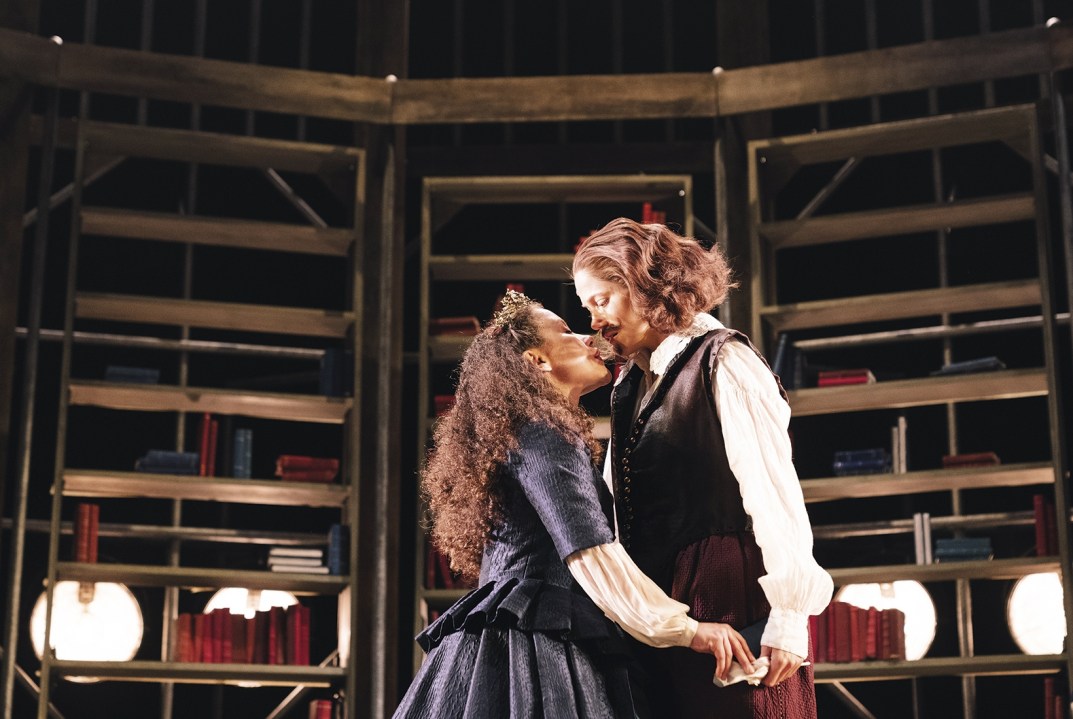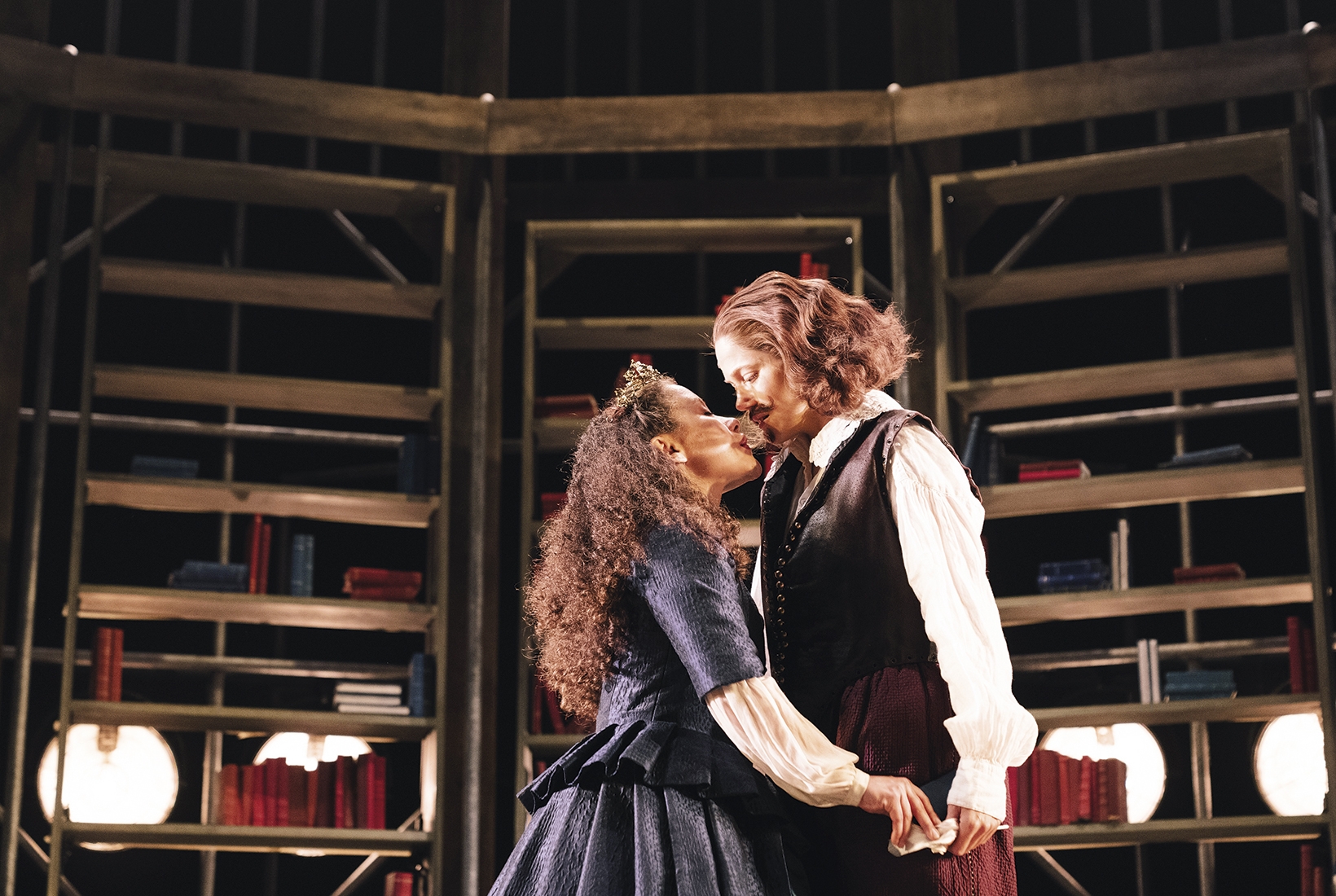Emilia is a period piece about Emilia Bassano who may have been the ‘dark lady’ of Shakespeare’s sonnets. The writer, Morgan Lloyd Malcolm, declines to turn the subject into a history play and instead creates a larky sketch show with snippets of literary gossip. Our heroine enters as a frightened teenager contemplating the horrors of courtship: ‘Men sniff at me like dogs.’ Marriage, she shudders, will crush her, mind and body. ‘As I grow, I must shrink.’ She’s also a poet who needs a publisher but she’s thwarted by institutional sexism in the book trade. ‘Women’s poetry?’ screeches a male reader. ‘The most dangerous rubbish I’ve ever seen.’ At court, she encounters racists who sneer at her Spanish heritage. ‘My father,’ sniffs a baroness, ‘believes we are being inundated by families like yours.’ Emilia snaps back: ‘I’m not accountable to you or your father’s questionable opinions about people seeking new lives.’ It’s hardly Elizabethan repartee.
The slang continues even when Shakespeare shows up. The Bard, it seems, is a world-class bounder who seduces Emilia purely in order to filch her expressions and nick her ideas for play titles. When the sonnets are published, she throws a wobbly. ‘He takes my name and rubs it through the mud for his own gain. Is there anything more violating?’ Their liaison produces a baby, Cordelia. ‘Well done for not dying,’ says a midwife. ‘That would have been a massive drag.’ But the child doesn’t survive. Poor Emilia has to cope with her grief while sneaky Shakespeare sidles up behind her and takes dictation as she weeps. ‘I cannot heave my heart into my mouth,’ she sighs, a line that makes it into the first act of King Lear.
The piece isn’t quite sophisticated enough for A-level students but it would suit younger teenagers and kids
The political and emotional patterns of the play never vary and every scene is dominated by wars between the genders. (The fact that the country is ruled by Europe’s most powerful woman isn’t mentioned.) All the females are needy, skittish plotters determined to fight the patriarchy, and every male is either a narcissistic buffoon or an out-and-out sex pest. As an essay in cheap comedy the show is a great success. The all-female cast have a lot of fun impersonating the cads and rotters who exploit them. There’s a terrific atmosphere on stage as well. The costumes look fantastic and Joanna Scotcher’s set is a marvel of harmonious wooden verticals arranged around an ornamented circle. The piece isn’t quite sophisticated enough for English students at A-level but it would suit younger teenagers and kids.
Jonathan Coe’s 1994 novel What a Carve Up! has been turned into a Zoom movie by the Barn Theatre, Lawrence Batley Theatre and New Wolsey Theatre. The title refers to the murder of six members of the powerful Winshaw clan who ‘enjoyed unparalleled levels of power at every level of British society for generations’. The chief suspect is a novelist who was hired to write about these overmighty scoundrels but who found their conduct so nauseating that he chopped them to pieces instead.
Or did he? The case remains unsolved and the show opens with an investigative journalist quizzing a surviving member of the family, Joanna. She names her butchered relatives. ‘Mark, Dorothy, Thomas, Henry, Uncle Roddy and Hilary.’ We hear a lot about these dastardly millionaires. Henry Winshaw, MP ‘cut welfare payments and stopped free school meals’. Mark was an arms trader who knew Saddam Hussein. Dorothy built up a huge and exploitative agricultural empire. And so on. But the Winshaws don’t resemble a family of real human beings. They’re more like a contrivance into which every form of corruption and malignity can be poured.
Next we meet the chief suspect’s son, Raymond, who wants to solve the case. He’s joined by a Yorkshire copper, John, who contributes further evidence. The list of sleuths is completed by a fruity old relic, Findlay Onyx, who works as a private investigator despite having a criminal record for soliciting. ‘It’s a cruel world,’ he laments, ‘that punishes men for their need for companionship.’ This is a pretty cumbersome set-up: six corpses and four sleuths.
But we’re only halfway there. The probe into the killings opens up a second inquiry into the Winshaws’ conduct during the war. We hear about Great Aunt Tabs (‘mad as a hatter’) and her two brothers who were remotely connected with a search for a Nazi sympathiser. This second mystery turns on a chit of paper inscribed ‘cheese, celery, biscuit’. Could it be a secret code? Yes, the detectives assure us, because any normal person scribbling down those ingredients would have written ‘biscuits’. Right-oh.
Structurally, there are two problems with this well shot and attractively edited film. The multi-layered storyline doesn’t suit the single-drama format. More importantly, none of the investigators is affected by the outcome. Every character ends as they began. No one learns or changes. It’s fun to watch but that’s not drama.








Comments